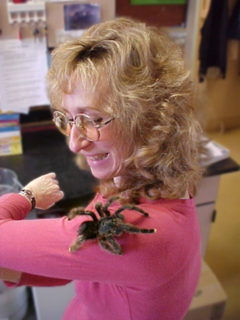A Quote by Frans de Waal
Experiments with animals have long been handicapped by our anthropocentric attitude: We often test them in ways that work fine with humans but not so well with other species.
Related Quotes
So far as this argument is concerned nonhuman animals and infants and retarded humans are in the same category; and if we use this argument to justify experiments on nonhuman animals we have to ask ourselves whether we are also prepared to allow experiments on human infants and retarded adults; and if we make a distinction between animals and these humans, on what basis can we do it, other than a bare-faced - and morally indefensible - preference for members of our own species?
Humans — who enslave, castrate, experiment on, and fillet other animals — have had an understandable penchant for pretending animals do not feel pain. A sharp distinction between humans and 'animals' is essential if we are to bend them to our will, make them work for us, wear them, eat them — without any disquieting tinges of guilt or regret. It is unseemly of us, who often behave so unfeelingly toward other animals, to contend that only humans can suffer. The behavior of other animals renders such pretensions specious. They are just too much like us.
Humans are particularly interesting; our culture is incredible, there's no doubt about that. In many respects, no other species matches ours. But in quite a few respects, they do, and that can help us, perhaps, to better understand our own culture. We look at the ways humans are similar to other animals, and at the ways they differ, rather than just saying, "We have culture and you don't."
Those who consume animals not only harm those animals and endanger themselves, but they also threaten the well-being of other humans who currently or will later inhabit the planet. ... It is time for humans to remove their heads from the sand and recognize the risk to themselves that can arise from their maltreatment of other species.
It must be stressed that there is nothing insulting about looking at people as animals. We are animals, after all. Homo sapiens is a species of primate, a biological phenomenon dominated by biological rules, like any other species. Human nature is no more than one particular kind of animal nature. Agreed, the human species is an extraordinary animal; but all other species are also extraordinary animals, each in their own way, and the scientific man-watcher can bring many fresh insights to the study of human affairs if he can retain this basic attitude of evolutionary humility.
It has been an obsession of human beings to create a hierarchy that places the human species on top and lumps all the "other animals" together beneath us. The resulting "speciesism" allows us to look upon animals as less deserving of all manner of rights and considerations than humans. To support this lower status, humans have argued that animals act instinctually; don't have souls; don't feel physical pain like we do; and lack self-consciousness, cognitive intelligence, emotional feelings, morality, and ethics.
My aim is to advocate that we make this mental switch in respect of our attitudes and practices towards a very large group of beings: members of species other than our own - or, as we popularly though misleadingly call them, animals. In other words, I am urging that we extend to other species the basic principle of equality that most of us recognize should be extended to all members of our own species.
Another thing cooking is, or can be, is a way to honor the things we're eating, the animals and plants and fungi that have been sacrificed to gratify our needs and desires, as well as the places and the people that produced them. Cooks have their ways of saying grace too... Cooking something thoughtfully is a way to celebrate both that species and our relation to it.
Typically, defenders of experiments on animals do not deny that animals suffer. They cannot deny the animals' suffering, because they need to stress the similarities between humans and other animals in order to claim that their experiments may have some relevance for human purposes. The experimenter who forces rats to choose between starvation and electric shock to see if they develop ulcers (which they do) does so because the rat has a nervous system very similar to a human being's, and presumably feels an electric shock in a similar way.
When humans act like animals, they become the most dangerous of animals to themselves and other humans, and this is because of another critical difference between humans and animals: Whereas animals are usually restrained by the limits of physical appetites, humans have mental appetites that can be far more gross and capacious than physical ones. Only humans squander and hoard, murder and pillage because of notions.
Human relationships with predators have always been thorny. Predators are the first creatures our kind purposely eradicates. Too often, people feel humans are and should be in control; we are enraged to discover this is not true. And when other creatures share our appetites and kill our livestock (often animals we were raising to kill, ourselves), we call them vandals and murderers...Predators are the most persecuted creatures on Earth.

































